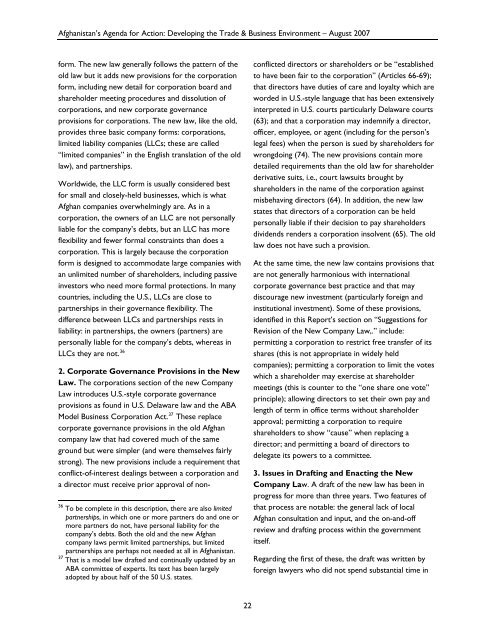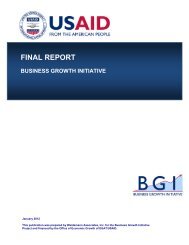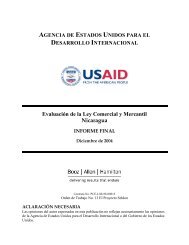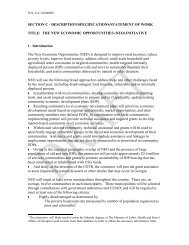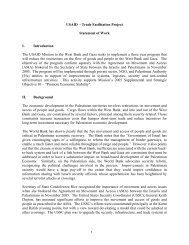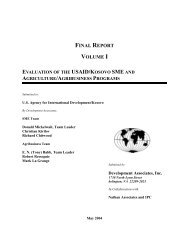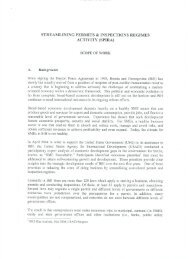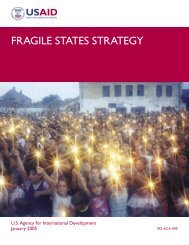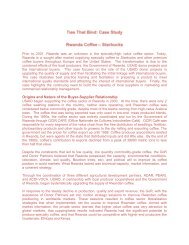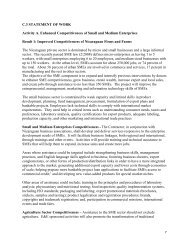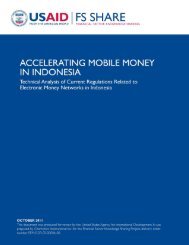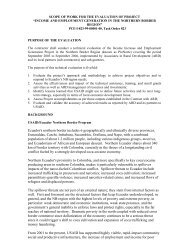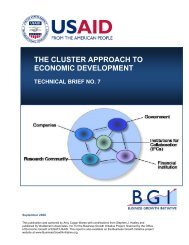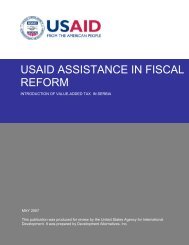Afghanistan's Agenda for Action - Economic Growth - usaid
Afghanistan's Agenda for Action - Economic Growth - usaid
Afghanistan's Agenda for Action - Economic Growth - usaid
Create successful ePaper yourself
Turn your PDF publications into a flip-book with our unique Google optimized e-Paper software.
Afghanistan’s <strong>Agenda</strong> <strong>for</strong> <strong>Action</strong>: Developing the Trade & Business Environment – August 2007<strong>for</strong>m. The new law generally follows the pattern of theold law but it adds new provisions <strong>for</strong> the corporation<strong>for</strong>m, including new detail <strong>for</strong> corporation board andshareholder meeting procedures and dissolution ofcorporations, and new corporate governanceprovisions <strong>for</strong> corporations. The new law, like the old,provides three basic company <strong>for</strong>ms: corporations,limited liability companies (LLCs; these are called“limited companies” in the English translation of the oldlaw), and partnerships.Worldwide, the LLC <strong>for</strong>m is usually considered best<strong>for</strong> small and closely-held businesses, which is whatAfghan companies overwhelmingly are. As in acorporation, the owners of an LLC are not personallyliable <strong>for</strong> the company’s debts, but an LLC has moreflexibility and fewer <strong>for</strong>mal constraints than does acorporation. This is largely because the corporation<strong>for</strong>m is designed to accommodate large companies withan unlimited number of shareholders, including passiveinvestors who need more <strong>for</strong>mal protections. In manycountries, including the U.S., LLCs are close topartnerships in their governance flexibility. Thedifference between LLCs and partnerships rests inliability: in partnerships, the owners (partners) arepersonally liable <strong>for</strong> the company’s debts, whereas inLLCs they are not. 362. Corporate Governance Provisions in the NewLaw. The corporations section of the new CompanyLaw introduces U.S.-style corporate governanceprovisions as found in U.S. Delaware law and the ABAModel Business Corporation Act. 37 These replacecorporate governance provisions in the old Afghancompany law that had covered much of the sameground but were simpler (and were themselves fairlystrong). The new provisions include a requirement thatconflict-of-interest dealings between a corporation anda director must receive prior approval of non-36 To be complete in this description, there are also limitedpartnerships, in which one or more partners do and one ormore partners do not, have personal liability <strong>for</strong> thecompany’s debts. Both the old and the new Afghancompany laws permit limited partnerships, but limitedpartnerships are perhaps not needed at all in Afghanistan.37 That is a model law drafted and continually updated by anABA committee of experts. Its text has been largelyadopted by about half of the 50 U.S. states.conflicted directors or shareholders or be “establishedto have been fair to the corporation” (Articles 66-69);that directors have duties of care and loyalty which areworded in U.S.-style language that has been extensivelyinterpreted in U.S. courts particularly Delaware courts(63); and that a corporation may indemnify a director,officer, employee, or agent (including <strong>for</strong> the person’slegal fees) when the person is sued by shareholders <strong>for</strong>wrongdoing (74). The new provisions contain moredetailed requirements than the old law <strong>for</strong> shareholderderivative suits, i.e., court lawsuits brought byshareholders in the name of the corporation againstmisbehaving directors (64). In addition, the new lawstates that directors of a corporation can be heldpersonally liable if their decision to pay shareholdersdividends renders a corporation insolvent (65). The oldlaw does not have such a provision.At the same time, the new law contains provisions thatare not generally harmonious with internationalcorporate governance best practice and that maydiscourage new investment (particularly <strong>for</strong>eign andinstitutional investment). Some of these provisions,identified in this Report’s section on “Suggestions <strong>for</strong>Revision of the New Company Law,.” include:permitting a corporation to restrict free transfer of itsshares (this is not appropriate in widely heldcompanies); permitting a corporation to limit the voteswhich a shareholder may exercise at shareholdermeetings (this is counter to the “one share one vote”principle); allowing directors to set their own pay andlength of term in office terms without shareholderapproval; permitting a corporation to requireshareholders to show “cause” when replacing adirector; and permitting a board of directors todelegate its powers to a committee.3. Issues in Drafting and Enacting the NewCompany Law. A draft of the new law has been inprogress <strong>for</strong> more than three years. Two features ofthat process are notable: the general lack of localAfghan consultation and input, and the on-and-offreview and drafting process within the governmentitself.Regarding the first of these, the draft was written by<strong>for</strong>eign lawyers who did not spend substantial time in22


